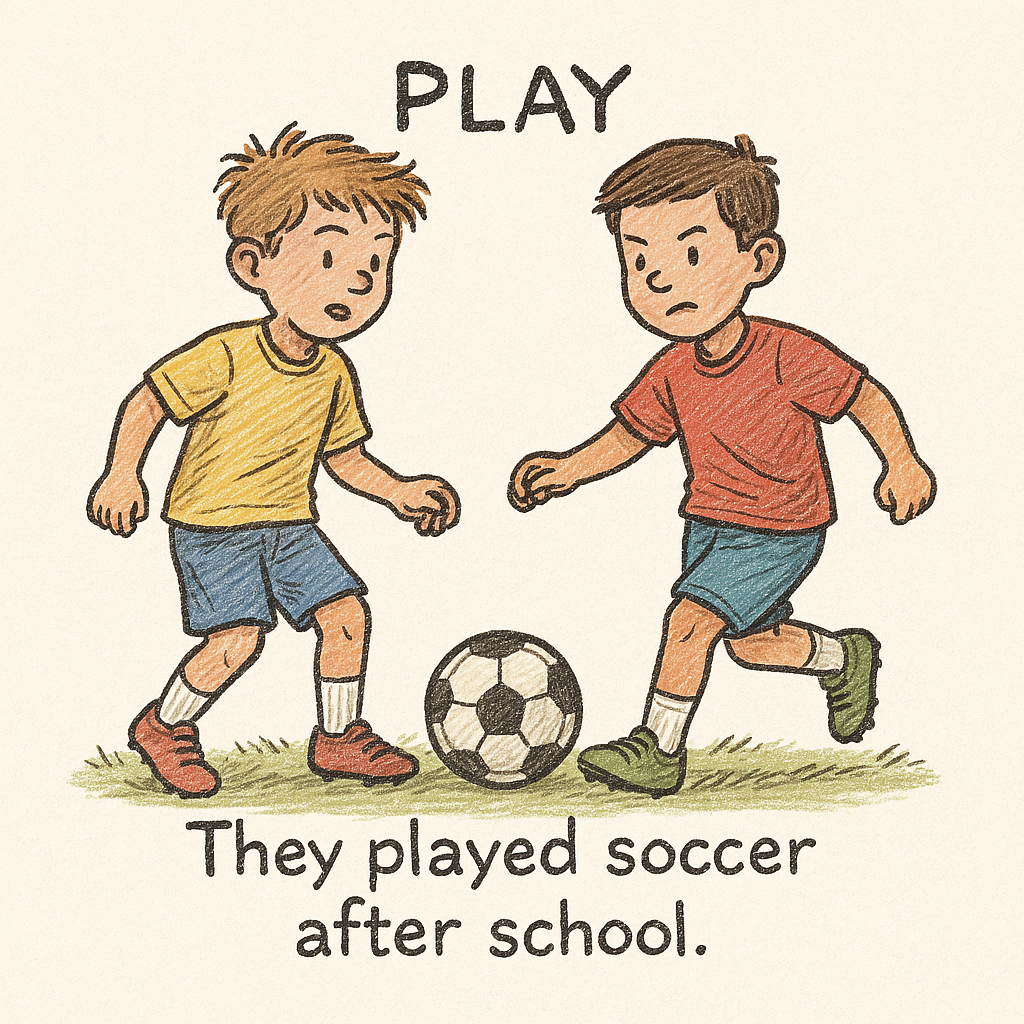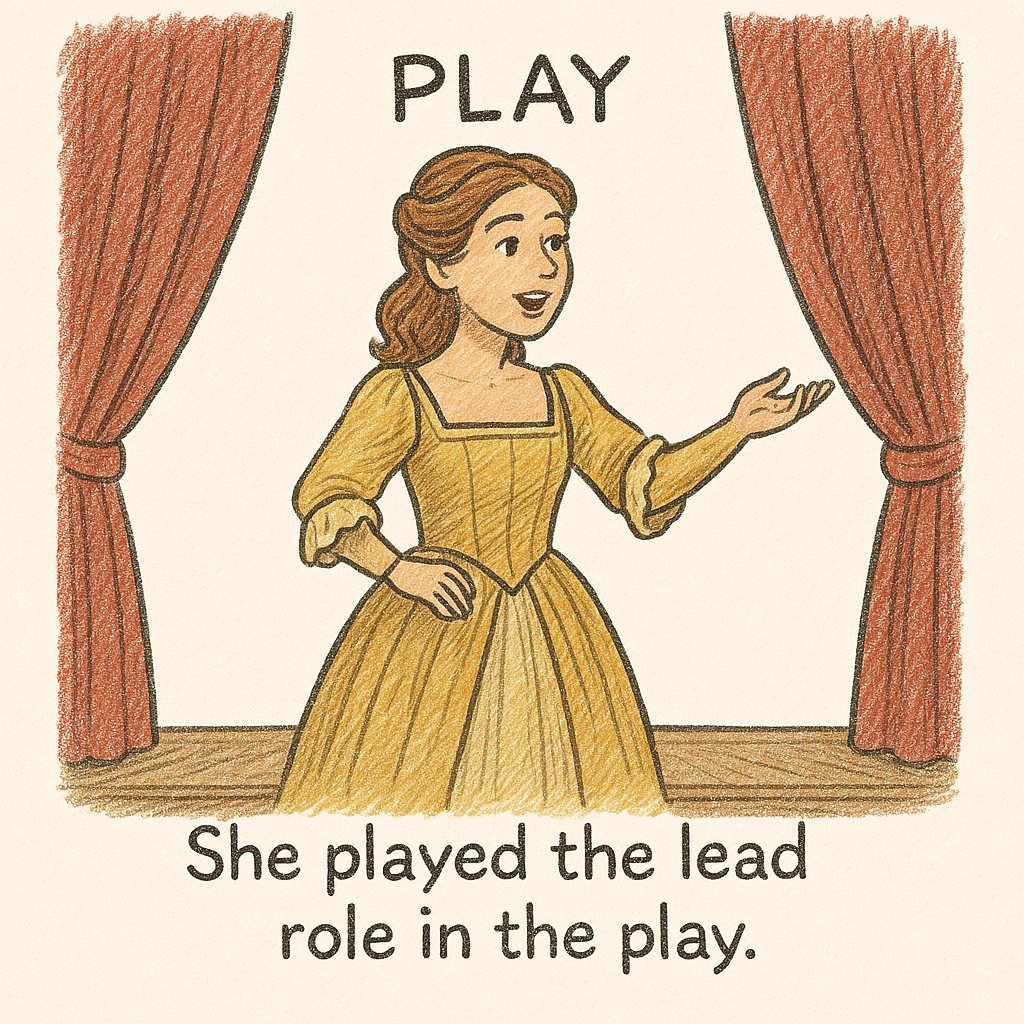Play
Definition
Play refers to engaging in activities for enjoyment, participating in a game or sport, or performing a role in a theatrical production.
Parts of Speech
- Verb
- Noun
Pronunciation
American English
- IPA Pronunciation: /pleɪ/
- Respelling: PLAY
British English
- IPA Pronunciation: /pleɪ/
- Respelling: PLAY
Etymology
The word "play" originates from the Old English "plegian," meaning "to exercise" or "to frolic," and is related to the Middle Dutch "pleyen," meaning "to dance" or "to leap." It has been used in English since the early medieval period.
Derivatives
- Player (noun)
- Playful (adjective)
- Replay (noun/verb)
- Playtime (noun)
- Playwright (noun)
Synonyms
- Perform
- Engage
- Act
Antonyms
- Work
- Rest
- None
Usage
The term "play" is versatile, used in entertainment, sports, and performance contexts. Examples include "Children love to play in the park" (verb) and "The play was well-received by critics" (noun).
Related Terms
- Game: An activity with rules, often for enjoyment or competition.
- Performance: The act of presenting a form of art, such as drama or music.
- Recreation: Activities done for relaxation and enjoyment.
Detailed Definitions
Verb
- To engage in an activity for enjoyment: Refers to recreational or leisurely actions.
- Example: "They played soccer after school."
- To perform a role or part: Refers to acting in a theatrical production or media.
- Example: "She played the lead role in the play."
- To operate or use something: Refers to engaging with devices or media.
- Example: "He played a song on the guitar."
Noun
- A theatrical production: Refers to a staged drama or performance.
- Example: "The play was a Shakespearean comedy."
- An action or move in a game or sport: Refers to a specific instance or strategy in competition.
- Example: "That was a great play by the team."
- A recreational activity: Refers to leisure activities, especially for children.
- Example: "The kids were engaged in play all afternoon."
play



🇨🇳 Mandarin
- 玩 (wán) - play
- IPA: /wǎn/
- Respelling: wan
- 演奏 (yǎnzòu) - perform
- IPA: /jɛn˥˩˦ t͡sow˥˩/
- Respelling: yen-tsoh
🇮🇳 Hindi
- खेलना (khelna) - play
- IPA: /kʰeːl.naː/
- Respelling: khel-na
- प्रदर्शन करना (pradarshan karna) - perform
- IPA: /pɾəd̪əɾʃən kəɾnə/
- Respelling: pra-dar-shan kar-na
🇪🇸 Spanish
- Jugar - play
- IPA: /xuˈɣar/
- Respelling: hoo-gar
- Realizar - perform
- IPA: /rea.liˈθar/ or /rea.liˈsar/
- Respelling: re-a-li-thar or re-a-li-sar
🇫🇷 French
- Jouer - play
- IPA: /ʒue/
- Respelling: zhoo-ay
- Exécuter - perform
- IPA: /ɛɡzekyte/
- Respelling: eg-zeh-kew-te
🇸🇦 Modern Standard Arabic
- يلعب (yla'b) - play
- IPA: /jæˈlʕabu/
- Respelling: ya-la-bu
- أداء (_adaa') - perform
- IPA: /ʔadˤaːʔ/
- Respelling: a-daa
🇧🇩 Bengali
- খেলা (khela) - play
- IPA: /kʰe.la/
- Respelling: khe-la
- পার্ফর্ম করা (parphorm kora) - perform
- IPA: /pɑrfɔrm kɔra/
- Respelling: par-form kor-a
🇷🇺 Russian
- Играть (igrat') - play
- IPA: /ɪˈɡratʲ/
- Respelling: ee-grat
- Выполнять (vypolnyat') - perform
- IPA: /vɨpɐlˈnʲætʲ/
- Respelling: vy-pol-nyat
🇵🇹 Portuguese
- Jogar - play
- IPA: /ʒɔˈɡaɾ/
- Respelling: zho-gar
- Realizar - perform
- IPA: /ʁɨa.liˈzaɾ/
- Respelling: rhea-li-zar
🇮🇩 Indonesian
- Bermain - play
- IPA: /bər'main/
- Respelling: ber-main
- Menampilkan - perform
- IPA: /mənaːmˈpilkan/
- Respelling: me-nam-pil-kan
🇩🇪 German
- Spielen - play
- IPA: /ˈʃpiːlən/
- Respelling: shpee-len
- Aufführen - perform
- IPA: /aʊfˈfyːʁən/
- Respelling: auf-fueh-ren
🇯🇵 Japanese
- 遊ぶ (asobu) - play
- IPA: /a̠so̞bɯ̟ᵝ/
- Respelling: a-so-bu
- 演じる (enjiru) - perform
- IPA: /ẽ̞ɲd͡ʑiɾɯ̟ᵝ/
- Respelling: en-ji-ru
🇻🇳 Vietnamese
- Chơi - play
- IPA: /cɤ̆j˧ˀ˦/
- Respelling: choy
- Thể hiện - perform
- IPA: /thɛ˧ˀ˨ hien˧˧/
- Respelling: the hien
🇰🇷 Korean
- 놀다 (nolda) - play
- IPA: /no̞ɭda̠/
- Respelling: nol-da
- 공연하다 (gongyeonhada) - perform
- IPA: /ko̞ŋ.jʌ̹n.ha̠da̠/
- Respelling: gong-yeon-ha-da
🇹🇷 Turkish
- Oynamak - play
- IPA: /ojnaːk/
- Respelling: oy-nahk
- Performans göstermek - perform
- IPA: /peɾfɔrmans ɟøstærmek/
- Respelling: per-for-mans go-ster-mek
🇵🇰 Urdu
- کھیلنا (khelna) - play
- IPA: /kʰeːlnaː/
- Respelling: khel-na
- پرفارم کرنا (perform karna) - perform
- IPA: /pɛɾfɔɾm kəɾnaː/
- Respelling: per-form kar-na





